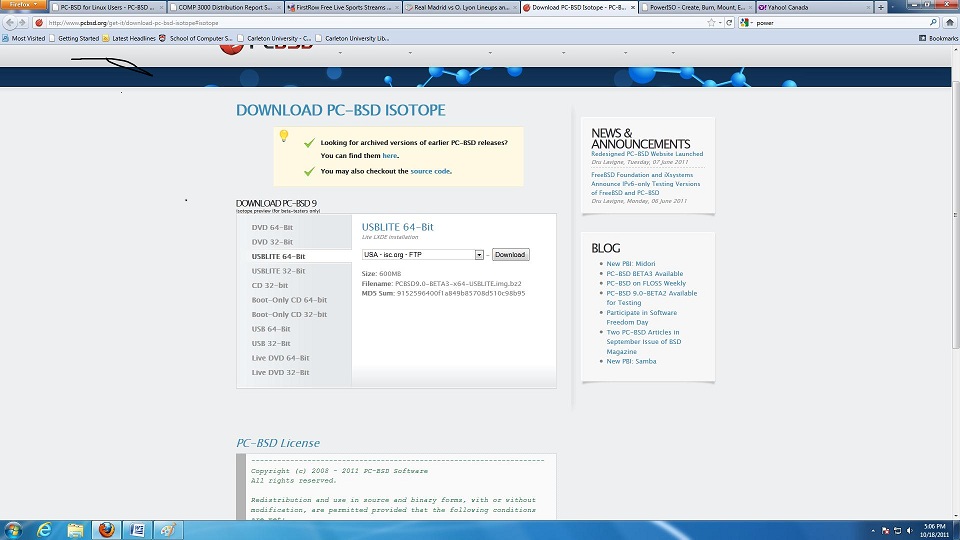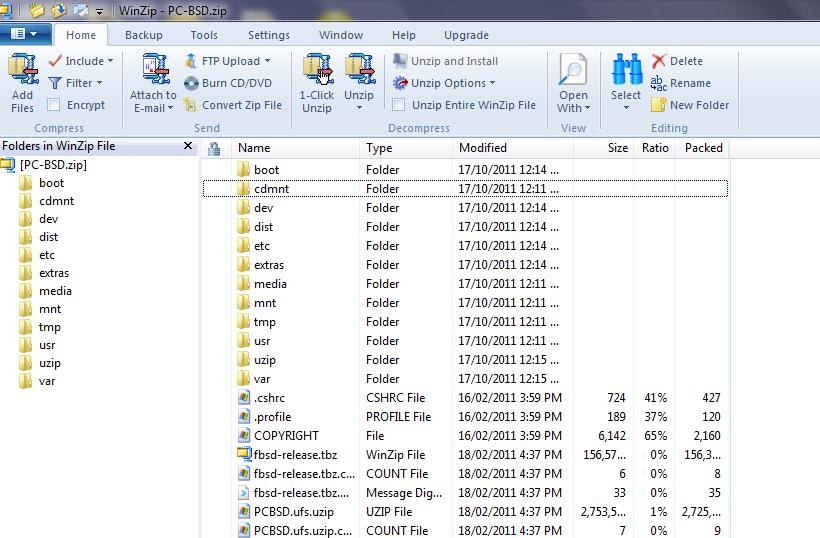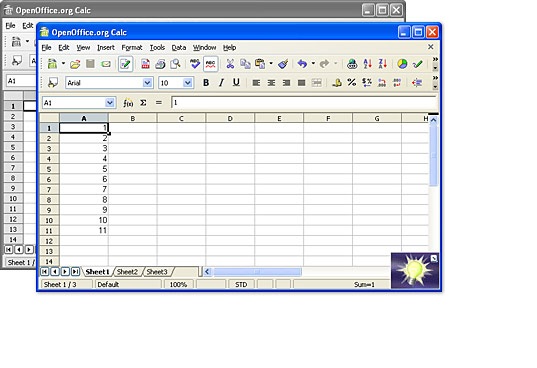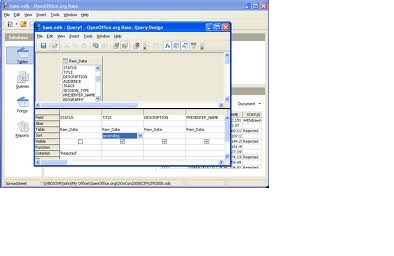COMP 3000 2011 Report:PC-BSD
Part I
BACKGROUND
I will be working on the PCBSD operating system, a free operating system usable by anyone.This distribution was originally founded in 2005 by Kris Moore.PCBSD is a customized edition of free bsd, which is basically still a functional freeBsd system under the hood. PcBsd is therefore a pre-configured freeBsd with a graphical installer,graphical package management,pre-installed packages and some handy graphical utilities .<ref>Introduction to PC-BSD. http://wiki.pcbsd.org/index.php/Introduction Retrieved Dec 19, 2011.</ref>. PcBSd comes configured so all you have to do is install. Although originally a freebsd, there are still a few differences such as:
• It was created for desktop use while freebsd was created with server use in mind.
• You can connect digital camera or usb sticks automatically because it is preconfigured.
• It is installed by a graphical installer and not a text based installer. etc
The main goals of pcbsd are:
• Easy installation, insert installation media, reboot system and answer a couple of questions.
• Video,sound,network and other devices are automatically configured.
• It is easy to manage software with pcbsd’s Appcafe.
• PCBSD is virus free
• Pcbsd supports a number of languages, ex japanese.The system has an installed japanese game in it. To name a few of the goals.
PCBSD is currently backed by iXsystems and derived from Bsd Unix. This PC-BSD 9.0BETA2 version can be downlaoded here: PC-BSD 9.0 BETA2. I downloaded USBlite 64 bits with a size of 3.0GB. I will therefore give stp by step instructions on how to download using USBlite 64-BIT.
Installation/Startup
I had problems downloading the OS directly with my laptop, there was always an error in the download process so after downloading through winzip, it downloaded as a “.tar” file instead of a “.img”. After about 2days of trying, I eventually downloaded through a desktop and transferred to a usb and that did the trick. Also, I tried to download DVD 64-Bit using poweriso , PowerIso is meant to act like a real dvd(or a susbstitute for real dvds), in which burn disc, create bootable usb drive, etc. But this wasn’t recognised by pcBsd, so if you are going to download using DVD bit, I recommend you get a real dvd. The link to power iso is up there, look at it, its pretty neat. The basic steps were.
1. Go to website and pick an option from the the download options (in my case USBiIte 64-Bit). Save file wherever you want to and Download, this takes between 2-3hours.
2. After downloading, transfer your downloaded file in a usb. Then transfer to your laptop.
3. You need a zip utility for the next step, winzip or 7zip. Transfer the downloaded file onto your laptop from the usb, then zip the file using either winzip or 7zip. It should look like this.
4. You would also have to format you usb (it is also adviseable to use a free usb,because when formatting all data will be erased),Make sure you have atleast a 4gb usb for this. Go to my computer, right click on the usb drive of your choice, click the format option, and under filesystem, ensure it is FAT32.
Here are a few images to help you
5. Download win32-image-writer, ensure you download the version that ends in –binary.zip. After which you use winzip or 7zip to unzip the program. Open the image writer, select the zip folder you saved it in, select the formatted usb device then click on write to write to the formatted usb.
6. After which you reboot your system, depending on the system, press,ESC,F1 or F2 to get into your BIOS setting. When you are in Bios setting, go to to Boot section, the system should recognize your usb as an external device, if your usb is not recognized then you should probably try downloading again. Click enter to make external drive the boot's priority, so every time you restart your system and the usb is connected to the laptop, it automatically starts PC-BSD from the formatted USB.
7. After which you should get a screen like this. I selected option 3 to boot in Live mode.
8. The rest should be, a breeze from here.
Basic Operation
The os comes with a list of common tasks or basic operations. I will talk about portjail and software manager because they are the main task operators.
1) Portjail provides an environment for users who are new to pcbsd packages and ports to learn how to use the software management command tools without affecting the other installed softwares.This is a cool application because you can basically try different tricks without messing anything up, this way you know what to do or what not to do in order to avoid crashing the main os itself and also become more acquainted with it.
A jail is a type of virtual environment where anything that occurs inside the jail does not affect the rest of the operating system<ref>Port Jail Definition. http://wiki.pcbsd.org/index.php/Ports_Jail Retrieved Dec 19, 2011.</ref>.
A portjail which is basically a terminal works just similar to the main pcbsd console. I tried an example in accessing the rc directory using port jail and the main console. For PortJail I wrote the following command: cd /etc, cd rc.d, ls. This displayed the files that run in the system in addition to other files. using the main console, I used this command : cd /usr/local/etc, cd rc.d, ls. If you try the command line for portjail in the main console or vice versa,it returns an error of no such file or directory. Which shows that port jail is only similar but not necessarily the same as some command lines are different.
2)Software manager or PBI, from here you can download any available software and update the system as well. I tried downloading two files : Open office <ref> Open Office downloadable Utility. http://www.pbidir.com/bt/pbi/65/openoffice Retrieved Dec 19, 2011.</ref> and Warden <ref>Warden Downloadable untility. http://www.pbidir.com/bt/category/Inmates Retrieved Dec 19, 2011.</ref>.
I will explain more on the open office download process.
- OPen Office : After downloading OPen office 3.2.1 application,Eveytime I am to initialize it, I have to to pick either of the following desktop applications word processor,spreadsheet,presentation manager and drawing manager to work with.
UNfirtunately,the network has no status carrier so I can not connect to the internet because it does not recognize my driver <ref>None working wireless driver. http://wiki.pcbsd.org/index.php/Wireless_Testing Retrieved Dec 19, 2011.</ref> and this os does not recognize USB, so I could not show the pictures directly from my os. I hope this is a good enough written description.
I was also able to get files online similar to what mine looked like:
Example of Spreadsheet
To the left of the diagram you see various desktop application options
3)It also has an education section which I found interesting, with options such as math and language available.
Usage Evaluation
1.) Installing and download was not as easy as claimed.
2.) It takes between 4-5mins for the os to boot from Live mode.
3.) I am yet to find the control panel, or maybe it is saved as system settings. Although the os wiki page specifically said the os has a control panel.
4.) It does take some getting used to, but looks like a more fun and stress free os to use once you get used to it.
5.) It is Virus free, that’s a plus.
6.) The network configuration although complicated is quite handy.
7.) It doesn't give the option to shut down directly, so you would have to first reboot the system, switch to a different os then shut down.
8.) I kept getting a command screen each time I ask the system to restart.So I apparently have to type reboot or exit on the command page in order to actually leave the page,
this is a flaw on its own because you basically need to reboot the system twice in two different before it eventually reboots .
9.) The PCBSd handbook has instructions on any question or issue. Well scripted handbook.
This is a different, distribution from what I am used to but worth the time and effort.
References
<references/>








